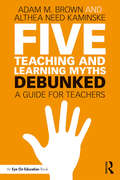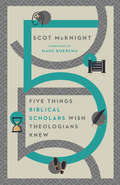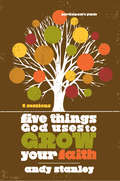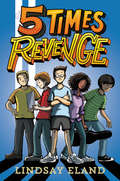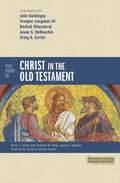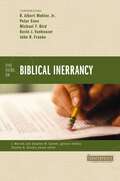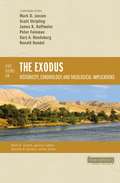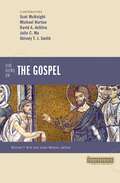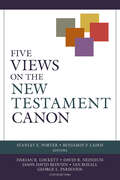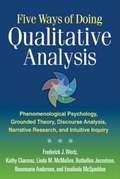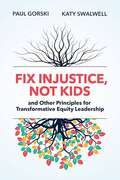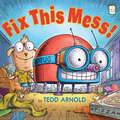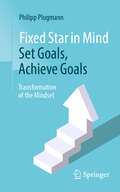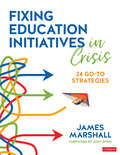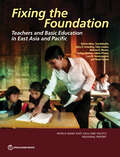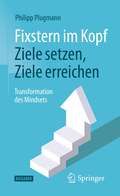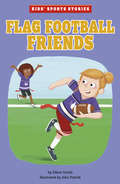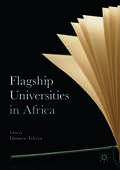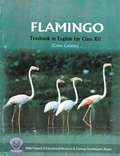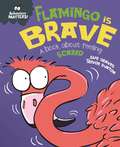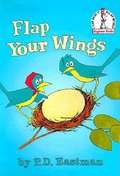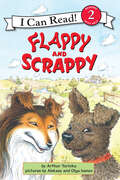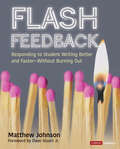- Table View
- List View
Five Teaching and Learning Myths—Debunked: A Guide for Teachers
by Adam M. Brown Althea Need KaminskeDrawing from research in developmental and educational psychology, cognitive science, and the learning sciences, Five Teaching and Learning Myths—Debunked addresses some of the most commonly misunderstood educational and cognitive concerns in teaching and learning. Multitasking, problem-solving, attention, testing, and learning styles are all integral to student achievement but, in practice, are often muddled by pervasive myths. In a straightforward, easily digestible format, this book unpacks the evidence for or against each myth, explains the issues concisely and with credible evidence, and provides busy K-12 teachers with actionable strategies for their classrooms and lesson plans.
Five Things Biblical Scholars Wish Theologians Knew
by Scot McKnightThe disciplines of biblical studies and theology should serve each other, and they should serve both the church and the academy together. But the relationship between them is often marked by misunderstandings, methodological differences, and cross-discipline tension. New Testament scholar Scot McKnight here highlights five things he wishes theologians knew about biblical studies. In a companion volume, theologian Hans Boersma reflects on five things he wishes biblical scholars knew about theology. With an irenic spirit as well as honesty about differences that remain, McKnight and Boersma seek to foster understanding between their disciplines through these books so they might once again collaborate with one another.
Five Things God Uses to Grow Your Faith Bible Study Participant's Guide
by Andy StanleyImagine what life would be like if you had PERFECT faith.In this video-based Bible study (DVD sold separately), pastor and best-selling author Andy Stanley builds a biblical case for five things God uses to grow BIG faith.Imagine how different your outlook on life would be if you had absolute confidence that God was with you. Imagine how differently you would respond to difficulties, temptations, and even good things if you believed with certainty that God was in all of it and was planning to leverage every circumstance for good.This Participant Guide is filled with helpful discussion starters, video overviews, a Leader's Guide and much more. It's designed to be used with the companion Five Things God Uses to Grow Your Faith DVD (sold separately). When used together they provide a powerful catalyst for spiritual growth.Sessions include:1. Big Faith2. Practical Teaching3. Providential Relationships4. Private Disciplines5. Personal Ministry6. Pivotal Circumstances
Five Times Revenge
by Lindsay ElandFive unlikely friends. Two bullies. One epic prank. Part The Breakfast Club and part The View from Saturday, this funny, heartwarming novel about friendship and standing up for yourself will appeal to fans of Chris Grabenstein and Jennifer L. Holm.Adam is the prank mastermind. Perk is his best friend and the computer genius. Pearl is the prettiest girl in school--and a violin prodigy. Ray looks like a big dumb jock, but he secretly wants to be an engineer. And Dutch is the often-bullied dork who is in tune with everyone's feelings. The five of them couldn't be more different. But there's one thing they have in common: they are fed up with Hill Parmar, the school bully--and his dad, their school principal who's always turning a blind eye. When Hill finally steps over the line, the five unlikely schemers band together for a prank like their middle school has never seen. Lindsay Eland weaves the five alternate points-of-view together for an accessible and funny school story--and a friendship story--for every reader.
Five Views of Christ in the Old Testament: Genre, Authorial Intent, and the Nature of Scripture (Counterpoints: Bible and Theology)
by ZondervanThe authors of the New Testament regularly quote and allude to Old Testament passages that point to the presence, person, and work of Jesus. Jesus himself claimed that Moses wrote about him (John 5:46). And on the road to Emmaus, Jesus instructed the disciples from "Moses and all the prophets" regarding himself (Luke 24:27).Though Christians affirm that the Old Testament bears witness to Christ, how the Old Testament writers did this is a matter of extensive debate. Furthermore, Christian biblical scholars also debate the degree to which contemporary interpreters of the Bible can follow the hermeneutics of the New Testament authors in using the Old Testament to point to the person and work of Jesus Christ.Five Views on Christ in the Old Testament is the first book to bring together in conversation the major views on how the Old Testament points to Christ. Contributors and views include:The First Testament Priority View (John Goldingay)The Christotelic View (Tremper Longman III)The Redemptive-Historical Christocentric View (Jason DeRouchie)The Reception-Centered Intertextual View (Havilah Dharamraj)The Premodern View (Craig Carter)Each contributor presents their preferred methodology, showing readers how their interpretive approach best explains the biblical data. Additionally, authors provide case studies of various Old Testament passages that equip readers to better compare the strengths and weaknesses of each of author's approaches. This essential resource will help readers learn practical steps to help them read the Old Testament more faithfully as it testifies to Jesus the Messiah.
Five Views on Biblical Inerrancy (Counterpoints: Bible and Theology)
by Stanley N. Gundry R. Albert Mohler Jr. Kevin J. Vanhoozer John R. Franke Michael F. Bird James R.A. Merrick Peter E. Enns Stephen M. GarrettThere is little doubt that the inerrancy of the Bible is a current and often contentious topic among evangelicals. Five Views on Biblical Inerrancy represents a timely contribution by showcasing the spectrum of evangelical positions on inerrancy, facilitating understanding of these perspectives, particularly where and why they diverge. Each essay in Five Views on Biblical Inerrancy considers: the present context and the viability and relevance for the contemporary evangelical Christian witness; whether and to what extent Scripture teaches its own inerrancy; the position’s assumed/implied understandings of the nature of Scripture, God, and truth; and three difficult biblical texts, one that concerns intra-canonical contradictions, one that raises questions of theological plurality, and one that concerns historicity. Five Views on Biblical Inerrancy serves not only as a single-volume resource for surveying the current debate, but also as a catalyst both for understanding and advancing the conversation further. Contributors include Al Mohler, Kevin Vanhoozer, Michael Bird, Peter Enns, and John Franke.
Five Views on the Exodus: Historicity, Chronology, and Theological Implications (Counterpoints: Bible and Theology)
by ZondervanGain a thorough understanding of the competing views on the historicity, chronology, and theological implications of the exodus. The biblical account of the Israelite exodus from Egypt is one of the most enduring narratives ever told and is a foundational event for several world religions. It resonates across cultures with its timeless themes of redemption and deliverance. It is also the only explanation the Bible gives for Israel's origin.Despite its unique legacy, many scholars regard the exodus as fictitious or a cultural memory that may not be a historical event. Even among those who believe the exodus happened, there is no consensus regarding its date.Five Views on the Exodus brings together experts in the fields of biblical studies, Egyptology, and archaeology to discuss and debate the most vexing questions about the exodus. Each offers their own view and constructive responses to other leading views:Early Date: The Exodus Took Place in the Fifteenth Century BC (Scott Stripling)Late Date: A Historical Exodus in the Thirteenth Century BC (James K. Hoffmeier)A Hyksos Levite Led Exodus in the Time of Ramesses II (Peter Feinman)Alternative Late Date: The Exodus Took Place in the Twelfth Century BC (Gary A. Rendsburg)The Exodus as Cultural Memory: A Transformation of Historical Events (Ronald Hendel)The Counterpoints series presents a comparison and critique of scholarly views on topics important to Christians that are both fair-minded and respectful of the biblical text. Each volume is a one-stop reference that allows readers to evaluate the different positions on a specific issue and form their own, educated opinion.
Five Views on the Gospel (Counterpoints: Bible and Theology)
by Michael Horton Scot McKnight David A. deSilva Julie C Ma Shively T.J SmithFive Views on the Gospel presents five different perspectives on the question "What is the gospel?" Presenting a variety of contemporary and tradition-based perspectives, each contributor answers key questions about the nature of the gospel. Questions contributors address include:What is the gospel?What is the context for understanding the New Testament teaching about the gospel?What are the primary biblical texts that you believe express the gospel and how do you understand them?What are people called to do with the gospel and what are the benefits promised by the gospel?How can the definition and proclamation of the gospel be contextualized and made relevant today?What example of an inadequate gospel and a false gospel can you offer?What does it mean to live a life worthy of the gospel? The CounterPoints format provides a unique opportunity for each contributor to set forth their own understanding of the gospel, to interact with competing perspectives, and for the editors to sum up points of agreement and disagreement and a path forward in the debate.Positions and Contributors include:The Reformation Gospel (Michael Horton)The King Jesus Gospel (Scot McKnight)The Wesleyan Gospel (David A. deSilva)The Pentecostal Gospel (Julie C. Ma)A Liberation Theology Gospel (Shively T. J. Smith) The Counterpoints series presents a comparison and critique of scholarly views on topics important to Christians that are both fair-minded and respectful of the biblical text. Each volume is a one-stop reference that allows readers to evaluate the different positions on a specific issue and form their own, educated opinion.
Five Views on the New Testament Canon (Viewpoints)
by Stanley E. PorterWhat historical, political, and ecclesial realities drove the canonization of the New Testament? How are the doctrines of Early Christianity related to the formation of the New Testament? Should the New Testament differ in authority from other early Christian texts? As these questions demonstrate, the enduring influence of the New Testament does not lessen the dispute over the events and factors leading to its adoption. Five Views on the New Testament Canon presents five distinct ways of understanding how the New Testament came to be: • A Conservative Evangelical Perspective – Darian R. Lockett • A Progressive Evangelical Perspective – David R. Nienhuis • A Liberal Protestant Perspective – Jason David BeDuhn • A Roman Catholic Perspective – Ian Boxall • An Orthodox Perspective - George L. Parsenios Each contributor addresses historical, theological, and hermeneutical questions related to the New Testament canon, such as what factors precipitated the establishment and recognition of the New Testament canon; the basis of any authority the New Testament has; and what the canon means for reading and interpreting the New Testament. Contributors also include a chapter each responding to the other views presented in the volume. The result is a lively exchange suitable for both undergraduate and graduate students seeking to grasp the best canon scholarship in biblical studies.
Five Ways of Doing Qualitative Analysis
by Kathy Charmaz Frederick WertzThis unique text provides a broad introduction to qualitative analysis together with concrete demonstrations and comparisons of five major approaches. Leading scholars apply their respective analytic lenses to a narrative account and interview featuring "Teresa," a young opera singer who experienced a career-changing illness. The resulting analyses vividly exemplify what each approach looks like in action. The researchers then probe the similarities and differences among their approaches; their distinctive purposes and strengths; the role, style, and subjectivity of the individual researcher; and the scientific and ethical complexities of conducting qualitative research. Also included are the research participant's responses to each analysis of her experience. A narrative account from another research participant, "Gail," can be used by readers to practice the kinds of analysis explored in the book.
Fix Injustice, Not Kids and Other Principles for Transformative Equity Leadership
by Katy Swalwell Paul GorskiSix principles for leading unequivocally in ways that disrupt inequity at its roots. Fix Injustice, Not Kids, and Other Principles for Transformative Equity Leadership offers a deep dive into the leadership values, commitments, and practices that help educational leaders create and sustain equitable schools and districts. Drawing from their extensive equity and inclusion work with schools, Paul Gorski and Katy Swalwell introduce key components of the equity literacy framework. They then challenge principals, equity professionals, and other K–12 leaders to embrace six guiding principles for meaningful equity leadership: Direct confrontation: Honestly naming and directly addressing the conditions that perpetuate inequity. Fix injustice, not kids: Avoiding deficit views, focused on "fixing" people who are marginalized, and embracing structural views, focused on eliminating inequitable conditions. Prioritization: Reimagining policies and practices and rebuilding institutional cultures in ways that account for historical and present inequities and their ramifications. Just access: Reconsidering what we provide equitable access to and whether it is itself equitable. Evidence-based equity: Applying an equity lens to the ways we collect and interpret data and exercising caution about popular data collection tools and methods. Care, joy, and sustainability: Withstanding inevitable resistance while embracing visions for love, joy, and community that cultivate and sustain transformative equity. Powerful stories from students and staff members reveal the troubling gaps between their everyday school experiences and the often high-optics, low-impact equity and diversity programs, events, and strategies embraced by school leaders. They also reveal key moments of growth as leaders learned how to deepen their equity understandings and enact more meaningful equity approaches. This thought-provoking book offers guidance to those who want to do better and are on the path to achieving some of today's most crucial goals: disrupting inequity and becoming transformative equity leaders.
Fix This Mess! (I Like to Read)
by Tedd ArnoldA funny story about a boy, a robot, and a BIG, BIG mess! This Level D book is perfect for kindergarten readers. From the creator of the widely popular Fly Guy books! "Fix this mess!" Jake tells Robug. But Robug just makes things worse. Robug finally figures out how to fix the mess—but it's not what Jake expected. Tedd Arnold's illustrations of Robug's frantic efforts are laugh-out-loud funny, as Robug tries again and again to fix the mess—stirring up clouds of dust, old pizza boxes, and banana peels, and leaving Jake's cat more and more confused as he bounces from the couch to the top of the television. Fix This Mess! is an International Literacy Association-CBC Children&’s Choice The award-winning I Like to Read® series focuses on guided reading levels A through G, based upon Fountas and Pinnell standards. Acclaimed author-illustrators--including winners of Caldecott, Theodor Seuss Geisel, and Coretta Scott King honors—create original, high quality illustrations that support comprehension of simple text and are fun for kids to read with parents, teachers, or on their own! Suitable for late kindergarten readers, Level D books feature wider vocabulary, longer sentences, and greater variety in sentence structure than Levels A, B, and C. When Level D is mastered, follow up with Level E.
Fixed Star in Mind: Transformation of the Mindset
by Philipp PlugmannFixing Your Star in Mind – Setting and Achieving Goals This book helps you unlock your full potential, adopt new mindsets, and advance your personal development. It keeps your personal "fixed star" in sight, enabling you to set specific goals and achieve them. Even when obstacles, tasks, and other people complicate the journey, you can use the strategies outlined in this book to overcome internal and external hurdles and reach your goals successfully. Using the metaphor of life as a long race, where winners are recognized not at the start but at the finish, the author illustrates that success often doesn’t go to those with the greatest talents or the best circumstances, but to those with a well-thought-out and radical approach to learning and work. You will learn how to effectively manage old thought patterns, challenges, and limiting habits on your way to personal success. Target audience: Anyone who wants to get more out of life. About the author: Prof. Dr. Dr. Philipp Plugmann has been working as a dentist and implantologist for 22 years, is a multiple entrepreneur, and is currently working on his third doctoral thesis. He has published numerous works and has been active for many years in higher education and as a mentor, earning recognition for his exceptional teaching and engagement.
Fixing Education Initiatives in Crisis: 24 Go-to Strategies
by James MarshallProven practices to rescue struggling education initiatives... or prevent a crisis before it starts. Insufficient planning, unclear outcomes, missing data--for leaders overseeing education initiatives, it can often seem like there′s a crisis around every corner. Drawing on decades of experience in assessment, evaluation, and data-driven decision-making, author and Professor of Educational Leadership James Marshall offers a combination of evidence-based practices and real-life experiences that provide practical solutions to the diverse challenges school leaders encounter as they implement new initiatives. Exploring oft-encountered challenges such as poor outcomes, waning interest or support from leadership, public relations issues, scaling and sustainability roadblocks, and other implementation-related obstacles--the book identifies six types of crises confronted by education leaders and offers valuable insights and solutions for each. Features include: Guidance to recognize the six types of education initiative crises and strategies for resolution tailored to each type 24 unique tools to positively impact challenges, such as the "Triage Tool" to prioritize crisis intervention and the "Don’t Swamp the Boat" tool to explore the complement of initiatives in your school Two case studies and real world examples illustrating the application of selected tools across a range of crisis types Whether you’re an education leader dealing with a program or initiative in crisis or proactively looking to prevent a crisis, Fixing Education Initiatives in Crisis provides practical solutions to navigate troubled initiatives and guidance for the design and implementation of healthy initiatives that yield predictable results.
Fixing Education Initiatives in Crisis: 24 Go-to Strategies
by James MarshallProven practices to rescue struggling education initiatives... or prevent a crisis before it starts. Insufficient planning, unclear outcomes, missing data--for leaders overseeing education initiatives, it can often seem like there′s a crisis around every corner. Drawing on decades of experience in assessment, evaluation, and data-driven decision-making, author and Professor of Educational Leadership James Marshall offers a combination of evidence-based practices and real-life experiences that provide practical solutions to the diverse challenges school leaders encounter as they implement new initiatives. Exploring oft-encountered challenges such as poor outcomes, waning interest or support from leadership, public relations issues, scaling and sustainability roadblocks, and other implementation-related obstacles--the book identifies six types of crises confronted by education leaders and offers valuable insights and solutions for each. Features include: Guidance to recognize the six types of education initiative crises and strategies for resolution tailored to each type 24 unique tools to positively impact challenges, such as the "Triage Tool" to prioritize crisis intervention and the "Don’t Swamp the Boat" tool to explore the complement of initiatives in your school Two case studies and real world examples illustrating the application of selected tools across a range of crisis types Whether you’re an education leader dealing with a program or initiative in crisis or proactively looking to prevent a crisis, Fixing Education Initiatives in Crisis provides practical solutions to navigate troubled initiatives and guidance for the design and implementation of healthy initiatives that yield predictable results.
Fixing the Foundation: Teachers and Basic Education in East Asia and Pacific (World Bank East Asia and Pacific Regional Report)
by Aaditya Mattoo Tara Beteille Rythia Afkar Mary Breeding Linden Tobias Pfutze Lars Sondergaard Noah YarrowCountries in middle-income East Asia and the Pacific were already experiencing serious learning deficits prior to the COVID-19 pandemic. COVID-related school disruptions have only made things worse. Learning poverty -- defined as the percentage of 10-year-olds who cannot read and understand an age-appropriate text -- is as high as 90 percent in several countries. Several large Southeast Asian countries consistently perform well below expectations on adolescent learning assessments. This report examines key factors affecting student learning in the region, with emphasis on the central role of teachers and teaching quality. It also analyzes the role education technologies, which came into widespread use during the pandemic, and examines the political economy of education reform. The report presents recommendations on how countries can strengthen teaching to improve learning and, in doing so, can enhance productivity, growth, and future development in the region.
Fixstern im Kopf: Transformation des Mindsets
by Philipp PlugmannFixstern im Kopf – Ziele setzen, Ziele erreichen Dieses Buch hilft Ihnen dabei, Ihr volles Potential zu entfalten, sich dabei neue Denkmuster anzueignen und Ihre weitere Persönlichkeitsentwicklung voranzubringen. Dabei lassen Sie Ihren persönlichen Fixstern nie aus den Augen, setzen sich konkrete Ziele und erreichen diese. Auch wenn Widerstände, Aufgaben und andere Menschen den Weg erschweren, können Sie mit den Empfehlungen in diesem Werk nützliche und erfolgversprechende Strategien einsetzen, um interne und externe Hürden zu meistern und die gesetzten Ziele zu erreichen. Anhand der Metapher, dass das Leben ein Langzeitrennen ist und die Sieger nicht am Start, sondern am Ziel erkannt werden, verdeutlicht Ihnen der Autor, dass häufig nicht diejenigen mit den größten Talenten oder mit den besten Rahmenbedingungen gewinnen, sondern diejenigen mit einer klug durchdachten und radikalen Lern- und Arbeitseinstellung. Sie erfahren, wie der Umgang mit alten Denkmustern, Herausforderungen und hinderlichen Gewohnheiten auf dem Weg zu Ihren persönlichen Zielen erfolgreich gestaltet werden kann. Zielgruppen: alle, die mehr aus ihrem Leben machen wollen. Zum Autor: Prof. Dr. Dr. Philipp Plugmann ist seit 22 Jahren als Zahnarzt und Implantologe tätig, mehrfacher Unternehmensgründer und arbeitet derzeit an seiner dritten Doktorarbeit. Dazu hat er zahlreich publiziert und ist seit vielen Jahren an Hochschulen und als Mentor aktiv und wurde für herausragende Lehre und Engagement ausgezeichnet.
Flag Football Friends (Kids' Sports Stories)
by Elliott SmithRiley and Jada click in any sport they play. This summer, it's flag football, and they can't wait to play wide receiver and quarterback. But Coach thinks Riley's better at center and splits up the duo, shaking Riley's confidence. It'll take a special play for her to step up and shine.
Flagship Universities in Africa
by Damtew TeferraThis book advances an in-depth, comprehensive analysis of flagship universities in Africa - the largest, most selective, and most prestigious universities on the continent. The book draws on a range of country-specific case-studies, including Botswana, Egypt, Ethiopia, Ghana, Kenya, Mauritius, Nigeria, Senegal, Tanzania and Zambia, to explore a range of issues associated with flagship universities and their role in higher education in Africa. . Newly-established institutions in new nation states, and states emerging from conflict, often rely on these flagship universities to train their academics, and build their intelligentsia; flagship universities are thus capacity-builders and trend-setters in their respective countries and sub-regions. This volume brings together a range of scholars to celebrate the impact, influence and contributions of African universities, not only within Africa, but across the globe The book will be of great significance to students and researchers in the field of education, particularly those with an interest in sociology and politics of higher education.
Flamingo (Core Course) class 12 - S.C.E.R.T Raipur - Chhattisgarh Board
by Raipur C. G. Rajya Shaikshik Anusandhan Aur Prashikshan ParishadThis textbook of English is called 'Flamingo'. It has been published for the students of class XII of humanities/arts/science/commerce streams who have chosen English core or English ‘A’. This textbook is designed for an interesting and innovative journey of learning of English literature and is prescribed in Private as well as in Public schools. This English textbook is in accordance with school’s syllabus and also helps students to prepare for CBSE Boards
Flamingo is Brave: A book about feeling scared (Behaviour Matters #35)
by Sue GravesFlamingo is Brave offers a gentle introduction to the concept of being brave and overcoming your fears for young children.This funny, charming story is the perfect way to introduce young children to being brave, and help them find ways to overcome their fears. Also included are suggestions for activities and ideas to talk through together to help children understand their emotions.Flamingo finds everything frightening and it stops him from joining in sometimes. With a little help from his friends, he finds a way to be braver and face his fears.The Behaviour Matters series of picture books provide a gentle means of discussing emotions, boosting self-esteem and reinforcing good behaviour. Supports the Personal, Social and Emotional Development Area of Learning in the Early Years Foundation Stage, and is also suitable for use with children in KS1 and can be used to discuss values. Suitable for children under 5.
Flamingos: Independent Reading Non-Fiction Blue 4 (Reading Champion #515)
by Sarah SnashallThis book is part of Reading Champion, a series carefully linked to book bands to encourage independent reading skills, developed with UCL Institute of Education (IOE)Flamingos is a non-fiction text reporting on flamingos, their diet and habitat. The simple sentence structure offers readers the opportunity for an independent reading experience with the support of the illustrations.Reading Champion offers independent reading books for children to practise and reinforce their developing reading skills.This early non-fiction text is accompanied by engaging artwork and a reading activity. Each book has been carefully graded so that it can be matched to a child's reading ability, encouraging reading for pleasure.
Flap Your Wings (Beginner Books(R))
by P. D. EastmanWhen a strange egg appears in their nest, Mr. and Mrs. Bird kindly take it upon themselves to raise the "baby bird" inside. But when the egg hatches, the Birds are in for a big surprise--"Junior" is the oddest-looking baby bird they've ever seen--with big, longjawsfull of teeth and an appetite to match. In fact, he looks more like a babyalligatorthan a baby bird! Nevertheless, the devoted Birds run themselves ragged feeding Junior until he gets so big, he must leave the nest or it will collapse underneath him. But how can Junior fly without wings? To the delight of the Birds--and readers!--the dilemma is solved when Junior takes off from a branch overlooking a pond.
Flappy and Scrappy (I Can Read Level 2)
by Arthur YorinksFlappy and Scrappy are friends - the kind who know just what to say when one feels sad. They′re the kind of friends who will play even when they don′t really want to, just to make the other happy. The kind who never forget a birthday. What kind of friends are they? Best friends.These three easy-to-follow stories about friendship will delight beginning readers everywhere.
Flash Feedback [Grades 6-12]: Responding to Student Writing Better and Faster – Without Burning Out (Corwin Literacy)
by Matthew M. JohnsonBeat Burnout with Time-saving Best Practices for Feedback For ELA teachers, the danger of burnout is all too real. Inundated with seemingly insurmountable piles of papers to read, respond to, and grade, many teachers often find themselves struggling to balance differentiated, individualized feedback with the one resource they are already overextended on—time. Flash Feedback seeks to alleviate these struggles by taking teachers to the next level of strategic feedback by sharing: How to craft effective, efficient, and more memorable feedback Strategies for scaffolding students through the meta-cognitive work necessary for real revision A plan for how to create a culture of feedback, including lessons for how to train students in meaningful peer response Downloadable online tools for teacher and student use
